| Listing 1 - 10 of 12 | << page >> |
Sort by
|
Book
ISBN: 0842023127 9780842023122 Year: 1991 Publisher: Wilmington (Del.): Scholarly resources,
Abstract | Keywords | Export | Availability | Bookmark
 Loading...
Loading...Choose an application
- Reference Manager
- EndNote
- RefWorks (Direct export to RefWorks)
Soviet Union --- URSS --- Foreign relations --- Archival resources --- Bibliography --- Library resources --- Relations extérieures --- Fonds d'archives --- Bibliographie --- Fonds documentaires --- URSS, --- Politique extérieure --- --1918-1945 --- --Soviet Union --- Relations extérieures --- --1918-1945, --- Archival resources. --- Bibliography. --- Library resources. --- URSS, 1922-1991 --- Soviet Union - Foreign relations - 1917-1945 - Library resources --- Soviet Union - Foreign relations - 1917-1945 - Bibliography --- Soviet Union - Foreign relations - 1917-1945 - Archival resources
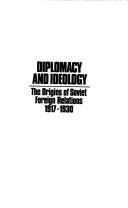
ISBN: 0803998481 080399849X 9780803998483 9780803998490 Year: 1979 Volume: 9 Publisher: London: Sage,
Abstract | Keywords | Export | Availability | Bookmark
 Loading...
Loading...Choose an application
- Reference Manager
- EndNote
- RefWorks (Direct export to RefWorks)
International relations. Foreign policy --- Russian Federation --- Soviet Union --- URSS --- Foreign relations --- Relations extérieures --- Russia --- Relations extérieures --- Soviet Union - Foreign relations - 1917-1945.
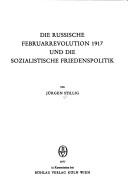
ISBN: 3412005762 9783412005764 Year: 1977 Volume: 2 Publisher: Köln: Böhlau,
Abstract | Keywords | Export | Availability | Bookmark
 Loading...
Loading...Choose an application
- Reference Manager
- EndNote
- RefWorks (Direct export to RefWorks)
Russia --- Soviet Union --- History --- Foreign relations --- -Russia --- -History --- -Soviet Union --- Russia - History - February Revolution, 1917 --- Soviet Union - Foreign relations - 1917-1945
Book
ISBN: 9780415410120 0415410126 9780203847008 9781136938207 9781136938245 9781136938252 9780415625425 Year: 2010 Volume: 12 Publisher: Milton Park: Routledge,
Abstract | Keywords | Export | Availability | Bookmark
 Loading...
Loading...Choose an application
- Reference Manager
- EndNote
- RefWorks (Direct export to RefWorks)
The Caucasus is a strategically and economically important region in contemporary global affairs. Western interest in the Caucasus has grown rapidly since 1991, fuelled by the admixture of oil politics, great power rivalry, ethnic separatism and terrorism that characterizes the region. However, until now there has been little understanding of how these issues came to assume the importance they have today. This book argues that understanding the Soviet legacy in the region is critical to analysing both the new states of the Transcaucasus and the autonomous territories of the North Caucasus. It examines the impact of Soviet rule on the Caucasus, focusing in particular on the period from 1917 to 1955. Important questions covered include how the Soviet Union created 'nations' out of the diverse peoples of the North Caucasus; the true nature of the 1917 revolution; the role and effects of forced migration in the region; how over time the constituent nationalities of the region came to re-define themselves; and, how Islamic radicalism came to assume the importance it continues to hold today. A cauldron of war, revolution, and foreign interventions - from the British and Ottoman Turks to the oil-hungry armies of Hitler's Third Reich - the Caucasus and the policies and actors it produced (not least Stalin, Sergo Ordzhonikidze and Anastas Mikoyan) both shaped the Soviet experiment in the twentieth century and appear set to continue to shape the geopolitics of the twenty-first. Making unprecedented use of memoirs, archives and published sources, this book is an invaluable aid for scholars, political analysts and journalists alike to understanding one of the most important borderlands of the modern world.
Caucasus, Northern (Russia) --- Soviet Union --- History --- Politics and government --- Ethnic relations --- Relations --- Foreign relations --- Soviet UnionHistory --- Caucasus, Northern (Russia) - History - 20th century --- Caucasus, Northern (Russia) - Politics and government - 20th century --- Caucasus, Northern (Russia) - Ethnic relations - History - 20th century --- Caucasus, Northern (Russia) - Relations - Soviet Union --- Soviet Union - Relations - Russia (Federation) - Caucasus, Northern --- Soviet Union - Foreign relations - 1917-1945 --- Soviet Union - Foreign relations - 1945-1991
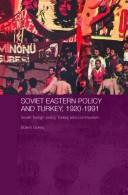
ISBN: 0415348498 9780415348492 Year: 2006 Volume: 5 Publisher: New York: Routledge,
Abstract | Keywords | Export | Availability | Bookmark
 Loading...
Loading...Choose an application
- Reference Manager
- EndNote
- RefWorks (Direct export to RefWorks)
Gokay presents an enlightening book that traces the relationship between the Soviet Union and Turkey on the one hand, and the Soviet Union and the Turkish Communist Party on the other, from the consolidation of the communist regime in Moscow until its fall. The book considers how 'Soviet Eastern Policy' was formed, how it changed over time, what the Soviet leaders hoped to gain in Turkey, and what impact Soviet policy had on the development of the Turkish communist movement. It is a valuable resource for students and scholars with an interest in Russian and Soviet politics and international relations.
Türkiye Komünist Partisi. --- Soviet Union --- Turkey --- URSS --- Turquie --- Foreign relations --- Relations extérieures --- Türkiye Komünist Partisi --- Communist International --- Communist InternationalSoviet Union --- Soviet UnionForeign relations --- Soviet Union - Foreign relations - Turkey --- Turkey - Foreign relations - Soviet Union --- Soviet Union - Foreign relations - 1917-1945 --- Soviet Union - Foreign relations - 1945-1991
Book
ISBN: 0231043600 9780231043601 Year: 1979 Publisher: New York: Columbia university press,
Abstract | Keywords | Export | Availability | Bookmark
 Loading...
Loading...Choose an application
- Reference Manager
- EndNote
- RefWorks (Direct export to RefWorks)
History of Eastern Europe --- anno 1900-1999 --- Russian Federation --- World War, 1939-1945 --- Soviet Union --- Foreign relations --- European War, 1939-1945 --- Second World War, 1939-1945 --- World War 2, 1939-1945 --- World War II, 1939-1945 --- World War Two, 1939-1945 --- WW II (World War, 1939-1945) --- WWII (World War, 1939-1945) --- History, Modern --- -Foreign relations --- -History of Eastern Europe --- -World War, 1939-1945 --- Russia --- Soviet Union - Foreign relations - 1917-1945
Book
ISBN: 2715801971 9782715801974 Year: 1979 Publisher: Paris: Balland,
Abstract | Keywords | Export | Availability | Bookmark
 Loading...
Loading...Choose an application
- Reference Manager
- EndNote
- RefWorks (Direct export to RefWorks)
Soviet Union --- URSS --- Foreign relations --- Relations extérieures --- 815 Geschiedenis --- 820 Internationale Betrekkingen --- 841 Politiek Bestel --- 842.1 Propaganda --- 856.2 Conflictbeheersing --- 861 Vredesbeweging --- 872 Massavernietigingswapens --- 873 Wapenbeheersing --- 875 Defensiegerelateerde industrie --- 876 Veiligheidspolitiek --- 876.1 Defensie --- 883.2 Oost-Azië --- 884 Europa --- 884.1 Oost-Europa --- -Soviet Union --- -Foreign relations --- -815 Geschiedenis --- Relations extérieures --- 921 --- geschiedenis Europa --- histoire Europe --- Soviet Union - Foreign relations - 1917-1945 --- Soviet Union - Foreign relations - 1945-1991
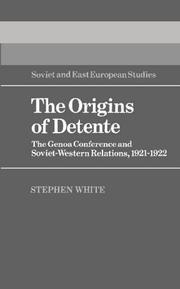
ISBN: 0521308763 9780521308762 0521526175 0511523785 9780511523786 9780521526173 Year: 1985 Publisher: Cambridge: Cambridge university press,
Abstract | Keywords | Export | Availability | Bookmark
 Loading...
Loading...Choose an application
- Reference Manager
- EndNote
- RefWorks (Direct export to RefWorks)
The Genoa Conference of April-May 1922 saw the first serious and sustained attempt to negotiate a modus vivendi between the newly established Soviet government in Moscow and the western capitalist countries that surrounded it. Drawing upon a wide range of archival and other sources, many of them unfamiliar or previously unexplored for this purpose, this study traces the evolution of Soviet-Western relations from the Revolution up to the autumn of 1921, when the proposal for a conference first began to emerge, and then considers in more detail the course of preconference diplomacy and the proceedings of the conference itself, up to the early summer of 1922. In his final chapter Dr White argues that the failure to resolve East-West differences at Genoa was attributable to a variety of circumstances, but above all to a failure of political will.
History of Eastern Europe --- History of Europe --- anno 1920-1929 --- Reconstruction (1914-1939) --- Detente --- Reconstruction, 1914-1939 --- Détente (Politique) --- Genoa Conference, --- Europe --- Soviet Union --- URSS --- Politics and government --- Foreign relations --- Politique et gouvernement --- Relations extérieures --- Genoa Conference --- Detente. --- Reconstruction (1914-1939). --- Détente (Politique) --- Economic and Financial Conference. --- Relations extérieures --- Geschiedenis van Oost- en Centraal-Europa --- Geschiedenis van Europa --- Europe - Politics and government - 1918-1945 --- Soviet Union - Foreign relations - 1917-1945 --- Arts and Humanities --- History --- International relations --- World politics --- World War, 1914-1918 --- Postwar reconstruction --- Reconstruction --- Economic aspects --- Conférence économique internationale de Gènes
Book
ISBN: 9780230252646 023035520X 9780230355200 0230252648 Year: 2012 Publisher: London: Palgrave MacMillan,
Abstract | Keywords | Export | Availability | Bookmark
 Loading...
Loading...Choose an application
- Reference Manager
- EndNote
- RefWorks (Direct export to RefWorks)
Addressing the impact of the Russian Revolution and change and continuity in diplomacy during the transition from Empire to Soviet Union, this book examines how Russia's diplomacy was conducted, the diplomats behind it, the establishment of the Soviet diplomatic corps and the steps taken to integrate the Soviets into the diplomatic world.
Diplomatic and consular service, Russian --- Diplomatic and consular service, Soviet --- History --- Russia --- Soviet Union --- Foreign relations administration --- Foreign relations --- Russia-History --- World politics --- Europe-History --- History, Modern --- Diplomacy --- International relations --- Modern history --- World history, Modern --- World history --- Colonialism --- Global politics --- International politics --- Political history --- Political science --- Eastern question --- Geopolitics --- International organization --- E-books --- Diplomatic and consular service, Russian - History --- Diplomatic and consular service, Soviet - History --- Russia - Foreign relations administration - History - 19th century --- Soviet Union - Foreign relations administration --- Russia - Foreign relations - 1801-1917 --- Soviet Union - Foreign relations - 1917-1945
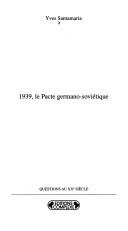
ISBN: 2870276958 9782870276952 Year: 1998 Volume: 95 Publisher: Bruxelles: Complexe,
Abstract | Keywords | Export | Availability | Bookmark
 Loading...
Loading...Choose an application
- Reference Manager
- EndNote
- RefWorks (Direct export to RefWorks)
Allemagne --- Diplomatie --- Duits-Soviet-Russisch niet-aanvals"verdrag, 1939 --- Duitsland --- Fédération de Russie --- German-Soviet pact --- Geschiedenis van de nieuwste tijden --- Guerres --- Histoire contemporaine --- Nazi-Soviet pact, 1939 --- Oorlogen --- Pacte de neutralite germano-sovietique, 1939 --- Pacte de non-agression germano-sovietique, 1939 --- Reich-Soviet nonaggression pact, 1939 --- Russische Federatie --- Russo-German pact --- Russo-German treaty, 1939 --- Soviet-German pact --- Traite germano-sovietique, 1939 --- World War, 1939-1945 --- 2ème guerre mondiale --- Diplomatic history --- Histoire diplomatique --- Germany --- Soviet Union --- URSS --- Foreign relations --- Relations extérieures --- Histoire des relations internationales --- --URSS, --- --1933-1939 --- --Guerre mondiale, 2e, --- Diplomatic history. --- Guerre mondiale, 2e, 1939-1945 --- World War, 1939-1945 - Diplomatic history --- URSS, 1922-1991 --- Germany - Foreign relations - Soviet Union --- Soviet Union - Foreign relations - Germany --- Germany - Foreign relations - 1933-1945 --- Soviet Union - Foreign relations - 1917-1945
| Listing 1 - 10 of 12 | << page >> |
Sort by
|

 Search
Search Feedback
Feedback About UniCat
About UniCat  Help
Help News
News